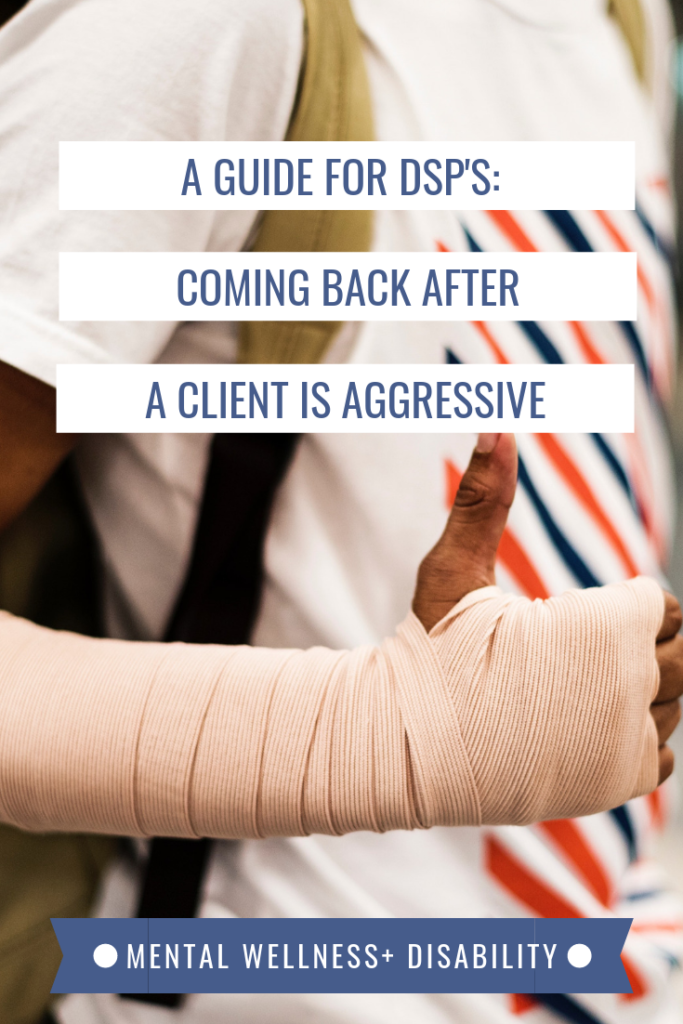In honor of DSP appreciation week, I wanted to share some posts especially for the DSPs out there. I polled the National Alliance for DSPs Facebook group page, asking DSPs what topics they’d like to hear about. Last week’s post on caring for yourself when you’re a professional caregiver was the winner. The runner up in the poll was this week’s topic: Coming back after a client is aggressive.
This is not just an academic or clinical discussion for me. I was a DSP and a Case Manager for many years.
Clients have punched, slapped, kicked, bitten, pulled my hair, strangled my throat, pushed me up against a wall… Which is all to say…. I’ve been there.
Coming back after a client is aggressive is really challenging. I know how hard it is to wake up for work the next day. You’re sore. Maybe you had to have blood work done or had to get extra shots. You’re just dreading going back to work.
I think a lot of people assume that the fear is physical. That you’re worried that a client will hurt you again.
And for sure there is a physical component of your fear. But usually, what’s really tough in these cases is coming back from the emotional break that you’ve experienced.

Why it is hard when a client is aggressive toward you as a DSP
Being a DSP means committing to caring for complete strangers with love and attention that you show your own family.
This is a person that you have laughed with and cried with. Maybe you’ve gone on vacation with them, helped in the shower, and so on.
This is a person that you have supported and cared for in very intimate ways.
When that person becomes aggressive towards you, it can make you wonder if they recognize or appreciate everything you’ve done for them. It can absolutely make you question if it’s worth it.
There are two approaches that can help you break out of that cycle of fear and questioning.
Acceptance and Empathy
Acceptance
Before becoming a therapist I worked as a Case Manager. I oversaw some group homes, but I mostly worked with clients who lived in their own apartments.
Sometimes other supervisors would come to me and say:
“Hey, this staff was working in the intensive Autism support home, and they got hit. They’re a really good staff but they’re nervous about coming back to work. Can they work a few days in the apartments so they don’t have to worry about being hit?”
And I would really kindly, but really firmly, say, ”no.”
Because if you’re going to be a DSP, you need to break free from the mindset that there are safe spaces, or times, or clients.
If you’re going to be a DSP, regardless of how ‘high functioning’ the clients you’re working with are, and no matter if you work the overnight shift when everyone’s asleep, there is always a risk that you could experience aggression.
It is a false sense of security to say “oh, great, I got assigned to work with this house of sweet little old ladies, they’ve never hit anyone, I can let my guard down”.
And by that, I mean emotional guard, not physical. Because you really can’t ever guarantee that.
This is a link to a recent study that gave an overview of aggression in ICF/DD group homes. The findings probably won’t surprise you. Staff in these homes are more likely than any other health care or social assistance workers to experience injury from client assault.
How to achieve acceptance before aggression happens
So, what do I mean when I say acceptance, and how do you achieve it?
You know those moments that you have with a client that are just plain fun?
Maybe you’re riding alone together in the van, and you’re doing your best carpool karaoke, and you’re both just laughing and enjoying being together?
In those moments when you love everything about your job, take a second, take a deep breath, and remind yourself that “this is a person who may hit me one day. It doesn’t mean that this wonderful moment wasn’t real or meaningful. It’ll just be another part of our story together when it happens. And I accept as such.”
And then get back to enjoying your time together.
Take moments like that to anticipate and accept client aggression before they happen.
That way, it won’t feel like such an unexpected crisis when it happens.
It’ll be something that you knew was possible, and that you weren’t surprised to experience.
Empathy
Now, let’s talk about empathy.
This is a very difficult but very helpful thing to do when a client is aggressive towards you.
Take a moment to step outside of your shock and your physical pain. Consider what led to that moment.
Probably you’ll have to write a whole report documenting it anyways, might as well use that as a time for reflection.
Challenge yourself to find empathy for the client who was aggressive towards you.
Can you imagine being so focused on whether your mom would call, and so frustrated and hopeless when she didn’t, that the ONLY way you could communicate how upset you were was to hit someone else.
What would it be like to not have the language skills or the patience or any other coping skill that would help you keep from hurting someone else because you were hurting?
What about walking into your home and being overwhelmed by the smell of a dinner cooking, that you felt you couldn’t escape it? Then everyone is trying to talk to you, the room is so loud and smelly that you just can’t deal, and you don’t know how to ask for the peace that you need, so, you hit the nearest thing to you because you need to see that you can do something, anything, even if it’s not helpful.
What would it be like to have so little control over your home environment?
Both examples hint at something that I often share when I’m training DSPs.
Finding empathy for your clients’ lack of control
If I were to summarize the reason that I see most of my clients with disabilities for therapy, it would be this: They have no control over their lives.
How they react to the feeling is unique to each person, but in general, that’s who I help: people with disabilities who feel powerless.
It’s so hard in those moments after you’ve been hurt by this person who you’ve given such good care to, but take a moment to really consider:
How much control did this client have over their environment?
Did they get to decide who was there, how loud it was, or what it smelled like?
Were they in charge of what activities were planned for the evening?
How about bigger picture stuff; did they get to decide what they’d wear, or which brand of toothpaste they’d use that morning, or even where they would live or work?
The answer to all those questions is probably no.
How about that person’s communication skills? Can they reliably and effectively let other people know their internal experience? Can they clearly and concisely communicate what will be most helpful to them when they are struggling to cope?
Again, probably no.
Take a moment to put yourself in their shoes. If your autonomy, choice, and skills were just as limited, can you imagine that there would be times when you’d lash out against the people you spent the most time with?
When you consider it, it is not so tough to find empathy.
A visual reminder of Acceptance and Empathy
Kintsugi is the Japanese art of repairing broken pottery with gold, silver, or platinum. Rather than throw away a broken bowl or vase, you celebrate the brokenness as a beautiful part of the object’s history.
Flaws aren’t hidden; they are highlighted.
The result is stunning. What once was considered broken and dysfunctional is now made even more unique and beautiful because of the love and attention given to crafting the repair.
To me, this is a perfect visual representation of what it can be when you take care to repair your relationships with a client after a ‘break’ in your rapport, such as when a client is aggressive towards you.
If it’s helpful, you can hold in your mind the vision of a cracked pot or bowl. As you show your client empathy and acceptance, visualize yourself lovingly repairing the pottery with a golden gloss. Find the beauty in the repair.
What’s at risk I can’t find acceptance and empathy?
I’m going to say something dramatic here, and I’m OK with that.
Some DSPs go through extra training or receive additional supervision to manage their emotional responses to being hurt at work. I think that’s a wonderful and helpful thing, and not at all a sign that you’re not cut out for the work.
However, some DSPs really cannot get to that place of empathy and acceptance, even with additional support. They are stuck in a place of fearing aggression, and then feeling resentment when aggression occurs.
If that’s where you’re at, then I hope you will consider: Is this is the right field of work for me? My suspicion is that it may not be.
If that’s the case, then I hope you will make the wise choice to leave the field. It’s not just important for you, or for your clients. It’s also critical for the next DSP who replaces you.
I have worked with many clients over the years who have learned that if they don’t like a DSP, all they must do is hit the DSP and the DSP will leave.
It sets up a very dangerous precedent for all the DSPs who come after you, if you teach a client that hitting someone is how to get rid of them.
I would love to hear from DSPs; does this resonate with you?
Have you got other advice to share with DSPs trying to come back after a client has been aggressive towards them?
Please use the social share buttons to share this post with other DSPs who may find it helpful!




